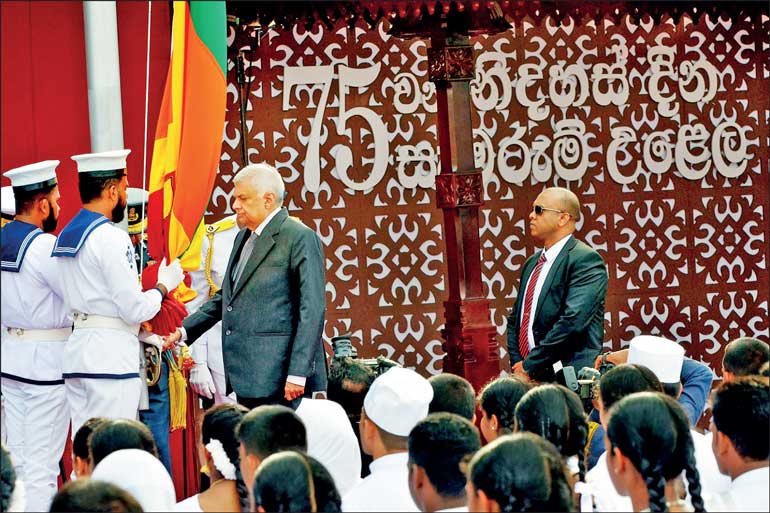Monday Feb 16, 2026
Monday Feb 16, 2026
Wednesday, 8 February 2023 00:20 - - {{hitsCtrl.values.hits}}

While we welcome the vision, really and truly, the wishful thinking embedded therein may have left some of us feeling that the Prez had missed a trick or two, canny politico though he may be – Pic by Shehan Gunasekara
 By now, you would know that the President recently publicly expressed a personal wish that Sri Lanka would rank among the world’s most developed nations by 2048 – the country’s 100th year since independence.
By now, you would know that the President recently publicly expressed a personal wish that Sri Lanka would rank among the world’s most developed nations by 2048 – the country’s 100th year since independence.
In his televised speech on our island nation’s 75th anniversary of shaking off the shackles of colonialism, our Head of State said: “We can become a developed country by 2048, if we work and move forward in a united and planned manner, envisioning peace and reconciliation.”
The Chief Executive of our Democratic Socialist Republic also told us that the road to this salutary state of affairs would be a long, tough, arduous one – yes, we know. It had dawned on us some time ago that our elected representatives appeared to be able, ready and willing to help us make sacrifices to achieve their lofty personal ambitions and petty partisan goals.
So while we welcome the vision, really and truly, the wishful thinking embedded therein may have left some of us feeling that the Prez had missed a trick or two, canny politico though he may be. It would be charitable to assume that some aspects of our present predicament escaped his attention for the nonce.
Although others who look back in anger on recent developments in which he too played his part would be constrained to attribute less redeeming virtues to the Chief Exec’s candour.
“We made mistakes from the beginning...” is the closest he came to an amorphous admission of culpability.
Critics of the regime may also sense more than some cognitive dissonance in the government’s crackdown on youth-led socio-political unrest in its principal administrator’s assertion that “the corrupt political factionalism that deceives the people, making them dependants and poor forever, should also be changed – this is the ‘system change’ that the youth of this country have been demanding ... my government, therefore, has embarked on a new path of reform to fulfil the needs of the youth.”
In fact, they might say it was a tone-deaf exercise in telling a hamstrung citizenry – youthful and otherwise – that they were expected to suck it up and do the 25-year dash with a touch more panache than they had been demonstrating of late... and no more protests at Galle Face, you hear?
Or as our fearless truth-teller would have it: “In politics, lies were spread instead of the truth. Politicians who spoke the truth were rejected by the people. ... We have no way out of this crisis with short cuts as some political parties are pointing out. ... The first six months of this year will be extremely difficult. We have to take this difficult situation in our stride, although unwillingly, for the sake of our country.”
Taking the situation in one’s stride runs to the tune of pomp and circumstances marches, evidently. It is, these days at least, the province of pompous ‘servants of the people’ on whom the irony of taking a salute from the services that sacrificed the flower of our chivalry is lost.
After all, a widely unwatched private celebration at inordinate cost to the state – cash-strapped to boot – to reassure oneself that sovereignty still means something (while the public at large go to bed hungry unseen) must look clumsy and callous to anyone who’s not daydreaming about the state of the nation; not today, but a quarter of a century down the road to dusty death...
Alternative
So what could or should you or I have done had it fallen to us to address the nation in these desperate times?
For starters, perhaps key figures in successive administrations since 1948 – or shall we say 1977? – could have been a tad more confessional about the part they had played (or the roles they had repeatedly reprised in government after government) in bringing Mother Sri Lanka to her knees.
Then again, should it have been too much to expect the architects of the cynical political culture that brought our country to this pretty pass we’re all in now to say what precisely had gone wrong, who exactly was to blame, and how actually would amends be made... culprits apprehended, criminals arrested, lost and/or stolen assets recovered?
Shall we be so bold, brave or foolhardy enough to essay an alternative address – in which some of the salient milestones in our intrepid journey so far could or should have received an honourable mention?
STRENGTHS: A great civilisation, a small but significant state, so much so that it was known as the Granary of the East, and recognised as a powerhouse of architecture, agriculture, engineering, etc.
Being the most prosperous country in South Asia for sure and possibly Asia at large – at the end of our colonial period.
A thriving, export-oriented economy; a manageable and healthy population; solid infrastructure suitable for 7 million people at the time; universal franchise being available since 1931...
An independent judiciary; a sterling civil service whose stalwarts were internationally recognised; free education; a positive balance of payments; highly educated political elite groomed for governance.
In 75 years, Sri Lankan’s life expectancy has increased by 30 years; there’s almost 100% electricity penetration; we’ve eliminated of a plethora of diseases; and become a net exporter of rice for the first time in 500 years – in 1948, rice production was at 1.8 tonnes per hectare; in 2015, it was 4.5 tonnes (of course, this was overturned overnight)
At the top of the Asian rankings for GDP in 1948, now lagging behind our sister states – even/especially those who saw us ‘the Singapore of South Asia’ (its redoubtable leader Lee Kuan Yew went on from expressing envious admiration of us to professing relief that his model city state did not emulate us).
WEAKNESSES: The collapse of our civilisation; internal divisiveness making us ripe for the picking for a new wave of colonisers from near and farther afield.
An unsustainable demographic growth – our population has tripled in the past 75 years without an attendant development in the requisite services and infrastructure; a lack of industrialisation.
Reducing the potential of a great country to rubble within a single decade since independence; political wrangling – including freebies, fermenting anti-minority sentiments and class warfare – that divided the nation; too much ‘free stuff’ for a truly industrious nation – free education, free healthcare, free employment (creating superfluous state jobs with pensionable salaries to secure political loyalty i.e. elections an auction of votes); free rice, free times (25 paid public holidays, 84 days maternity leave, absenteeism and lethargic work ethic, lots of freebies but little actually meaningful work done) – all of this requiring government borrowing over the decades resulting in a heavy external debt burden (over 100% of GDP).
No primary fiscal surplus since 1955; the key indicator of our exchange rate plummeted – by a staggering 11,000%! – from Rs. 3.50 to the US Dollar in 1948 to 375 rupees plus to the US$ today.
Nationalisation of a plethora of institutions – viz. banks, schools, hospitals, transport services, public utilities, newspapers, hotels, petroleum, shipping, insurance – to bolster state sector employment.
Subsequent creation of white-elephant state corporations to compete with the private sector, albeit unprofitably – all the while staffing those inefficient state enterprises with unsuitable relatives and unqualified political cronies; and later, political protests at the prospect of privatising those SOEs.
OPPORTUNITIES: A culture deeply rooted in the tolerant inclusivity of true Buddhism. To exercise the right to vote peacefully and regularly; and in the absence of a constitutionally enshrined right of recall – by petition, legislation or referendum – to evict authoritarian yet incompetent and corrupt regimes by voting with one’s feet... as was seen in the more salutary outcomes of the Aragalaya last year...
THREATS: The fragmentation of our island into four warring kingdoms in the late 16th century, enabling a wave of invaders to conquer and colonise us; hartals at the suspension of rice and other subsidies; disenfranchisement of Tamils, Muslims and Burghers over decades; brutal internecine wars over a protracted period following deliberate discrimination against a major minority.
A massive brain drain of even the majority Sinhalese today, creating deep voids in the workforce.
Nearly half our child population is undernourished – and 5.7 million citizens are facing food insecurity (despite free healthcare).
Almost a quarter of all students fail their O-Levels and a third flunk their A-Levels (despite free education and/or expensive private tuition in a milieu where almost 60% of students drop out of school before their A Levels at age 17 – per UNICEF).
The now-prevalent (and dominant for while) political culture has seen thugs, crooks and criminals elected to public office. Some of them are white-collar, others common or garden: they subscribe to and benefit from a mutually protective political culture that simply appeases public wrath by pretending to spar in Parliament.
Despite the sentiments of this SWOT – essayed brilliantly by Dr. Rohan Pethiyagoda recently in a faux-Independence Day speech – the cognitive dissonance in government continues in this vein... “We cannot be satisfied just by strengthening the economy. The entire system needs to be changed. All areas of this political system ... should be modified to suit the modern era. The nation, and we, should benefit from this change. More space should be created in the new system for representation and opinions of young people and women in particular.”
Really? Then the incumbent regime must go! The republic must be cleansed of the same old rotten political culture and its dilapidated relicts! And a fresh injection of clean, truly professional and competent people’s representatives must seek and be given public office sooner than later.
This may sit better with the avowed stance of the President that he’s not “attempting to treat the superficial condition with painkillers” but rather, seeking to “treat the root cause of the malaise”.
The rest is silence until 2048.
| Editor-at-large of LMD |